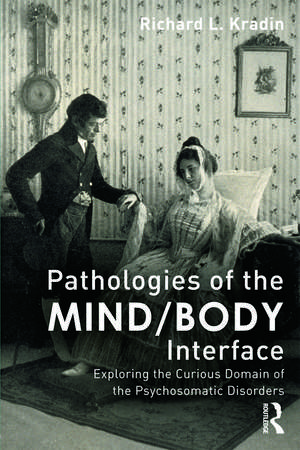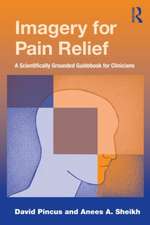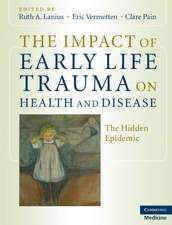Pathologies of the Mind/Body Interface: Exploring the Curious Domain of the Psychosomatic Disorders
Autor Richard L. Kradinen Limba Engleză Paperback – 5 noi 2012
| Toate formatele și edițiile | Preț | Express |
|---|---|---|
| Paperback (1) | 348.51 lei 6-8 săpt. | |
| Taylor & Francis – 5 noi 2012 | 348.51 lei 6-8 săpt. | |
| Hardback (1) | 1220.12 lei 6-8 săpt. | |
| Taylor & Francis – 29 oct 2012 | 1220.12 lei 6-8 săpt. |
Preț: 348.51 lei
Nou
Puncte Express: 523
Preț estimativ în valută:
66.70€ • 68.81$ • 56.45£
66.70€ • 68.81$ • 56.45£
Carte tipărită la comandă
Livrare economică 05-19 martie
Preluare comenzi: 021 569.72.76
Specificații
ISBN-13: 9780415636940
ISBN-10: 0415636949
Pagini: 192
Ilustrații: 28 b/w images, 16 tables, 26 halftones and 2 line drawings
Dimensiuni: 152 x 229 x 13 mm
Greutate: 0.27 kg
Ediția:New.
Editura: Taylor & Francis
Colecția Routledge
Locul publicării:Oxford, United Kingdom
ISBN-10: 0415636949
Pagini: 192
Ilustrații: 28 b/w images, 16 tables, 26 halftones and 2 line drawings
Dimensiuni: 152 x 229 x 13 mm
Greutate: 0.27 kg
Ediția:New.
Editura: Taylor & Francis
Colecția Routledge
Locul publicării:Oxford, United Kingdom
Public țintă
General and Professional Practice & DevelopmentCuprins
Introduction 1. Basic Concepts 2. Hysteria: The Psychosomatic Disorder Par Excellence 3. Somatophobia 4. Mind and its Development 5. Stress 6. The Placebo Response 7. The Psychosomatic Disorders 8. Psychosomatic Disorders: Living on the Edge 9. Treating the Psychosomatic Disorders 10. Conclusion
Notă biografică
Richard L. Kradin, MD, is a practicing Pulmonologist and Psychoanalyst at Massachusetts General Hospital (MGH), and Associate Professor of both Medicine and Pathology at Harvard Medical School. He is Director of the Dyspnea Clinic at MGH, and also past Research Director of the Mind/Body Medical Institute in Boston, MA. He is the author of The Placebo Response and the Power of Unconscious Healing (Routledge 2008), and of approximately 200 articles in medical literature. His research interests include psychological aspects of pulmonary disease, chronic fatigue syndrome, and the role of early attachment disturbances in the development of psychosomatic symptoms and placebo responses.
Recenzii
“Kradin’s unique perspective, as both a researching physician and a psychoanalyst, reminds one of the compassionate and courageous Freud, trusting the symptoms, even the psychosomatic ones, to lead us to a necessary understanding of the patient.” - Joseph Coppin PhD, Chair, Department of Depth Psychology, Pacifica Graduate Institute, California
“This is a highly readable and multi-dimensional review of an important cluster of human conditions encountered in medical practice that account for much human suffering and societal expense. In this exceptional new book Dr. Kradin, a medical scientist and psychoanalyst, provides us with pragmatic and insightful counsel.” - Gregory Fricchione, MD, Associate Chief of Psychiatry; Director, Benson Henry Institute for Mind Body Medicine at MGH; Director, Division of Psychiatry and Medicine, Massachusetts General Hospital; Professor of Psychiatry, Harvard Medical School
“A wonderful, wise, clear overview of where we are in understanding psychosomatic conditions. Dr. Kradin is one of the best qualified people to explore this important subject. He integrates the latest findings in neuroscience, attachment literature, psychoanalysis, the placebo effect, and internal medicine to help explain psychosomatics. This is a marvelous place to begin one's quest to understand psychosomatic illness, and mind-body medicine.” - Norman Doidge MD, FRCPC, author of The Brain That Changes Itself
“Dr. Kradin provides a very thorough overview of the historical thinking behind psychosomatic disorders, the complex developmental and psychosocial backgrounds of these patients, and the importance of a nuanced understanding of such individuals. Most importantly, he provides concrete and compassionate guidance for clinicians seeking to work more effectively with these challenging patients.” - Greg J. Lamberty, PhD, LP, ABPP, Rehabilitation Psychology Supervisor, TBI Model Systems Site Project Director, Clinical Neuropsychology Postdoctoral Residency Director, Minneapolis VA Health Care System
"This is a thorough yet concise overview of the history, classification, and treatment options for patients who present with psychosomatic disorders. I recommend this book to practitioners who are new to the subject and wish to explore it further, as well as those who already have an interest in the field." –Adrian Hemmings
"This is a volume that would be of interest both to readers in the general public as well as general practitioners and psychiatry residents. In 10 succinct and well-written chapters, he provides an excellent overview of the history and theoretical underpinnings of somatization." -Steven A. Epstein, MD, Journal of Psychiatric Practice
“This is a highly readable and multi-dimensional review of an important cluster of human conditions encountered in medical practice that account for much human suffering and societal expense. In this exceptional new book Dr. Kradin, a medical scientist and psychoanalyst, provides us with pragmatic and insightful counsel.” - Gregory Fricchione, MD, Associate Chief of Psychiatry; Director, Benson Henry Institute for Mind Body Medicine at MGH; Director, Division of Psychiatry and Medicine, Massachusetts General Hospital; Professor of Psychiatry, Harvard Medical School
“A wonderful, wise, clear overview of where we are in understanding psychosomatic conditions. Dr. Kradin is one of the best qualified people to explore this important subject. He integrates the latest findings in neuroscience, attachment literature, psychoanalysis, the placebo effect, and internal medicine to help explain psychosomatics. This is a marvelous place to begin one's quest to understand psychosomatic illness, and mind-body medicine.” - Norman Doidge MD, FRCPC, author of The Brain That Changes Itself
“Dr. Kradin provides a very thorough overview of the historical thinking behind psychosomatic disorders, the complex developmental and psychosocial backgrounds of these patients, and the importance of a nuanced understanding of such individuals. Most importantly, he provides concrete and compassionate guidance for clinicians seeking to work more effectively with these challenging patients.” - Greg J. Lamberty, PhD, LP, ABPP, Rehabilitation Psychology Supervisor, TBI Model Systems Site Project Director, Clinical Neuropsychology Postdoctoral Residency Director, Minneapolis VA Health Care System
"This is a thorough yet concise overview of the history, classification, and treatment options for patients who present with psychosomatic disorders. I recommend this book to practitioners who are new to the subject and wish to explore it further, as well as those who already have an interest in the field." –Adrian Hemmings
"This is a volume that would be of interest both to readers in the general public as well as general practitioners and psychiatry residents. In 10 succinct and well-written chapters, he provides an excellent overview of the history and theoretical underpinnings of somatization." -Steven A. Epstein, MD, Journal of Psychiatric Practice
Descriere
Unlike other texts on the subject, this book aims to provide a well-integrated approach to the diagnosis and treatment of the pervasive effects of the mind/body splitting that lead to somatoform disorders.



















